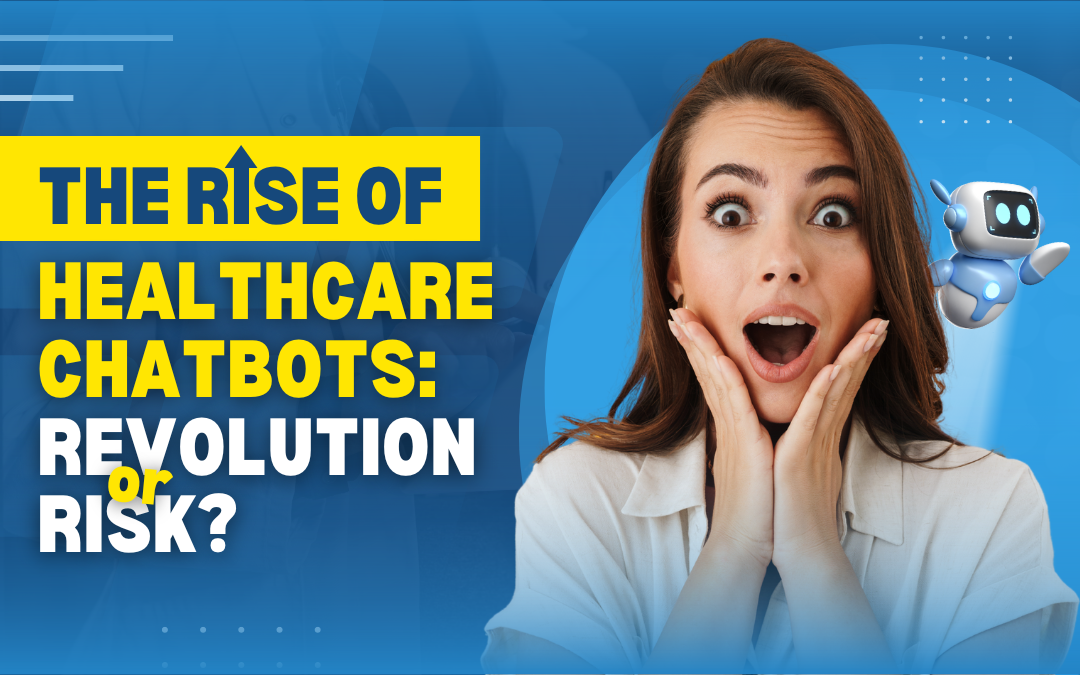Have you ever messaged a hospital chatbot to book an appointment or asked it whether your symptoms are serious? If yes, you’ve already met the newest member of the healthcare front desk: healthcare chatbots—an essential evolution of AI in healthcare.
These healthcare chatbots are no longer a futuristic concept—they’re very much here, answering questions, reducing waiting times, and streamlining administrative tasks. But the big question is: Are chatbots in the healthcare industry the game-changers they promise to be, or are we walking into a digital risk zone?
Today, healthcare chatbots play a critical role in bridging digital tools with patient interaction.

Why Chatbots Are Gaining Traction
Let’s face it—healthcare is evolving fast. In a world where patients expect real-time responses and personalized experiences, artificial intelligence in healthcare is rising to meet the challenge.
Here’s why medical chatbots are suddenly everywhere:
- Always-On Care: Whether it’s 2 p.m. or 2 a.m., a chatbot can answer patient queries instantly. This 24/7 availability means no more waiting for office hours.
- Admin Relief: From appointment scheduling to reminders, bots automate repetitive tasks—freeing up human staff for what really matters: patient care.
- Cost-Effective: Juniper Research predicts chatbot interactions will save the healthcare sector up to $11 billion annually by 2023.
- Scalability: A single chatbot can serve hundreds of users at once, making it perfect for clinics experiencing high traffic or limited staff.
- Easy App Integration: Chatbots work seamlessly within healthcare apps, supported by advanced healthcare app development services, to enhance telemedicine, reminders, and patient support.
And guess what? They’re only getting smarter with AI integration.
Thinking of implementing a chatbot for your clinic or hospital? At ClinicSpots Digital Services, we tailor AI solutions that actually fit your patient flow.
Risks and Challenges
But wait—are chatbots foolproof?
Not quite. Like any new technology, healthcare bots come with their own baggage. Here’s what you should know before jumping in headfirst:
- Lack of Emotional Intelligence: Unlike trained staff, bots can’t detect patient anxiety, frustration, or fear. That missing human touch can be critical in sensitive conversations.
- Misdiagnosis Risks: If a chatbot offers incorrect advice or misinterprets symptoms, the consequences can be serious.
- Data Privacy Issues: Patient conversations are packed with sensitive information. If a bot isn’t secured with HIPAA-compliant systems, that data is vulnerable.
- Regulatory Gaps: Many countries are still figuring out how to regulate medical AI tools. Without strict standards, quality can vary wildly.
The bottom line? Chatbots are great—when implemented responsibly, with the right tech and safeguards in place.
Real-Life Use Cases
Now, let’s shift gears and look at how AI in healthcare is working in the real world through chatbots.
- Triage Support: During the pandemic, bots like the CDC’s Clara helped millions screen COVID-19 symptoms without visiting a clinic.
- Personal Health Guidance: Babylon Health uses AI chatbots to analyze symptoms and offer medical advice tailored to the user’s profile.
- Appointment Booking: Many hospitals, including Apollo Hospitals, use bots to book, cancel, and confirm appointments in seconds.
- Pre- and Post-Visit Engagement: Bots remind patients about medications, upcoming procedures, and even collect feedback after visits.
At ClinicSpots, our healthcare chatbots handle queries, connect users to the right doctors, and simplify the booking journey—all in a few taps.
The Verdict – Revolution or Risk?
So, where do we stand?
There’s no doubt healthcare chatbots are more than just a passing trend. They’re being adopted by giants like Mayo Clinic, NHS, and Kaiser Permanente. But calling them a complete revolution might be premature.
Here’s the reality:
- For basic taskslike scheduling, reminders, or symptom checks, chatbots are a huge win.
- For emotional support or complex diagnosis, they still fall short.
That means the future of AI in healthcare isn’t replacing human care—it’s augmenting it. Chatbots take care of the repetitive stuff, and professionals handle what really matters: human interaction.
Conclusion
In a world that’s increasingly digital, healthcare is finally catching up—and leading the charge are medical chatbots. These tools, powered by artificial intelligence in healthcare, are already reducing costs, improving patient experience, and boosting engagement.
But as with any tech, they need the right strategy. That’s where ClinicSpots Digital Services comes in. With over 11 years of healthcare-specific digital expertise, we design chatbot solutions that are ethical, efficient, and deeply aligned with your brand voice.
FAQs
What are healthcare chatbots used for?
Can chatbots replace doctors?
Are medical chatbots accurate?
Is patient data safe with chatbots?
What is the future of chatbots in healthcare?
References:
- The Role of AI in Healthcare, National Library of Medicine:https://www.ncbi.nlm.nih.gov/pmc/articles/PMC6616181/
How Chatbots Are Transforming Healthcare, Forbes: https://www.forbes.com/sites/f


